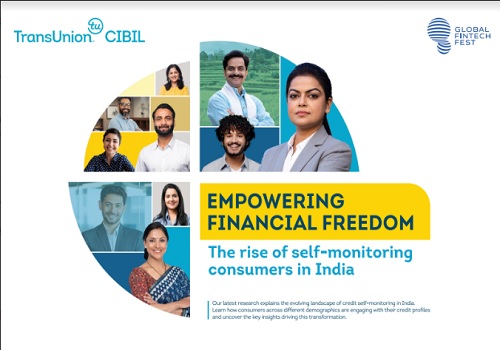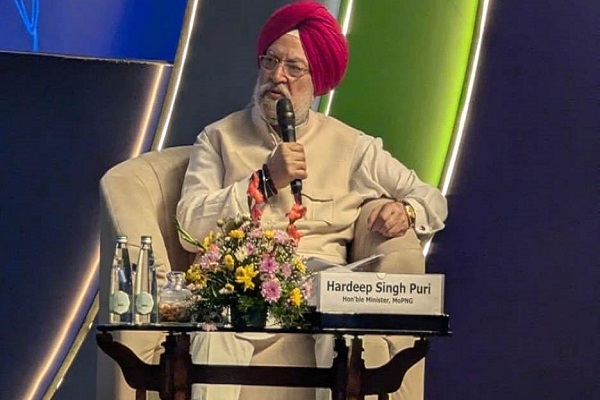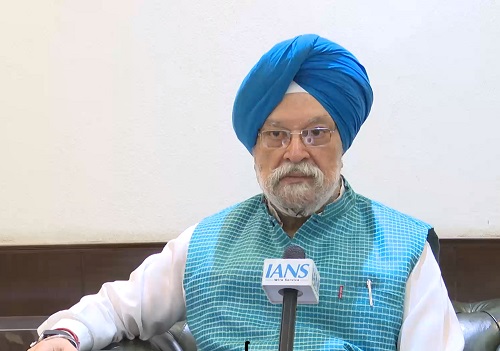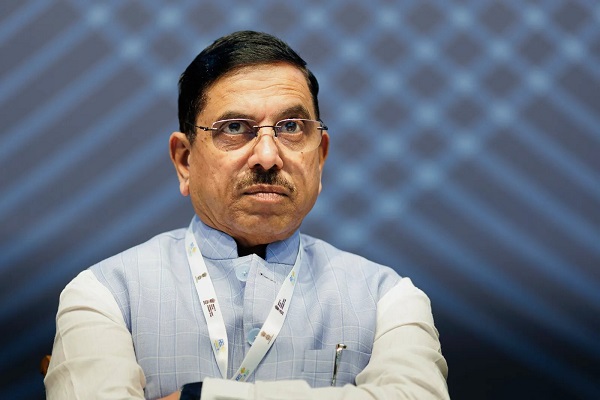TransUnion CIBIL's Flagship Report Empowering Financial Freedom: The Rise of Credit Self-Monitoring in India

To provide comprehensive insights into the credit behaviour of self-monitoring1 consumers across India, TransUnion CIBIL today released its flagship report, Empowering Financial Freedom: The Rise of Credit Self-Monitoring in India, which indicates that approximately 119 million Indians have monitored their CIBIL Scores as of March 2024. The report shows that the number of consumers monitoring their credit profile grew by 51% year-over-year (YoY) in FY23-24, reflecting that 43.6 million more consumers are intentional about knowing their credit status.
The report also reveals that young people are spearheading the credit revolution in India, with 77% of the 119 million credit monitoring consumers being Gen Z2 and Millennials3. The report also shows that 81% of consumers who started self-monitoring their credit score within six months of opening their first credit product are from non-metro regions.

Commenting on the findings of the report, the Managing Director and CEO of TransUnion CIBIL, Mr. Rajesh Kumar, said: “India’s growth story gets a strong foundation with improved consumer awareness about credit management as revealed in this report which shows a remarkable increase in consumers self-monitoring their credit report and improving their CIBIL Score after accessing it. This rise in consumer awareness, especially among youth, women and non-urban consumers, is a promising indicator of sustainable credit growth and increasing financial inclusion. It bodes well towards accomplishing our country’s USD 5 trillion economy goal in the coming years.
“TransUnion CIBIL is committed to empowering consumers and driving awareness of the importance of a good credit score for availing financial opportunities easily and at better terms. Our solutions help create economic opportunity for millions of people in India, and we take our responsibility to drive consumer awareness about credit management very seriously. As India’s pioneer credit information company, TransUnion CIBIL works constantly with our member credit institutions to strengthen the credit information ecosystem for the public good.”
The report shows a 70% growth in the share of women tracking their CIBIL Scores during FY23-24. This is an indicator that women are not only understanding credit management better, but they are also becoming more credit conscious and prioritizing financial planning. Over 72% of new credit monitoring women hail from beyond metros.
High credit visibility leading to wider financial participation
The report states that consumers are becoming more credit conscious, with results showing that 46% improved their credit profiles (CIBIL Score4) within six months of checking their CIBIL Score and Report, higher than the 41% seen in non-monitoring consumers. This indicates that credit conscious Indians are exploring more credit products and are also improving their scores to avail lower interest rates, better offers or even a higher credit amount.
The report also shows that within three months of checking their score, self-monitoring consumers showed an about 6X increase in opening a new credit line, when compared to non-monitoring consumers. Data shows that 44% of consumers are monitoring their CIBIL Score and Report at least four times within 12 months.
The report highlights that self-monitoring consumers tend to apply for credit opportunities after reviewing their credit history. Post-monitoring, the ownership of two-wheeler loans grew by 50%, consumer durable loans by 41%, gold loans grew by 38% and credit cards grew by 14%. However, personal loans decreased by 16%. Further location-based insights indicate that more new credit accounts were opened by self-monitoring consumers from non-metro regions.
Self-monitoring business entities maintain a good credit profile
The report also reveals that commercial entities checking their Company Credit Report (CCR) for the first time have grown by 12% (YoY) in FY23-24, and 47% of entities that self-monitor, maintain a commercial rank (CIBIL MSME Rank5) between 1 and 3, where a CMR-1 score represents the least risky profile. The report also shows that within three months of checking their CCR, 32% of commercial entities applied for a loan, with commercial vehicle loans, bank guarantees, long term loans, unsecured business loans and auto loans being the leading types of commercial tradelines availed by self-monitoring entities.

Rural India driving credit growth by being credit aware
The report shows that there has been a notable improvement in the number of Indians who are monitoring their credit, especially those in non-metro locations where self-monitoring consumers increased by 57% during FY23-24, compared to the 33% growth seen in metro locations.
Report also shows that there were 4.72 million new regional self-monitoring consumers in FY23-24, signaling the driving force behind the growing credit awareness. Among the top 10 states with the highest credit monitoring populations, Kerala, Tamil Nadu and West Bengal led the growth in self-monitoring consumers in FY23-24 over FY22-23.

Self-monitoring1 women borrowers showcasing increased credit confidence
As more women understand the implications and possibilities of credit, there are in turn more informed borrowers in India’s credit market. A 70% growth in self-monitoring women consumers shows that women are prioritizing financial planning and taking charge of their credit health. Further, the number of women consumers having a CIBIL Score of 730+ grew 1.8X in FY23-24.
Seventy one percent of women who accessed their CIBIL Score and Report for the first-time during FY23-24 were from non-metro regions, indicating a rapid increase in credit consciousness in these regions. The number of Gen Z self-monitoring women has shown a massive growth of 70% in FY23-24, compared to FY22-23.
 .
.
Young borrowers becoming more credit informed and key contributors to credit revolution
Insights from the report indicate young borrowers are becoming more credit disciplined and conscious – the number of Gen Z tracking their credit scores grew 1.5X in FY23-24. Ninety one percent of new credit users were Millennials and Gen Z in FY23-24. This early adoption indicates that these are the generations that will shape India's consumer credit future.
Younger Indians are adopting credit at an earlier stage in their lives, recognizing the importance of establishing a robust credit history. Gen Z self-monitoring consumers lead the pack with an average of 1.32 products, surpassing Millennials at 1.25 and others at 1.22. On average, self-monitoring consumers tend to hold 1.98 products, significantly more than their non-monitoring counterparts, who average 1.33 products.
“This report brings to light the fact that India is rapidly becoming financially savvy and credit conscious. With many credit institutions offering better terms and conditions for borrowers who have a higher CIBIL Score, it is beneficial for consumers to monitor and maintain a healthy credit profile for availing financial opportunities on better terms,” said Bhushan Padkil, Senior Director and Head of Consumer Interactive (Direct-To-Consumer) India at TransUnion CIBIL.
1Self-monitoring consumers are users who have proactively checked their CIBIL Score and Report at least once with TransUnion CIBIL.
2Gen Z are consumers born 1997 to 2012.
3Millennials are consumers born 1981 to 1996.
4CIBIL Score ranges from 300-900. Score tiers are subprime = 300-680, near prime = 681-730, prime = 731-770, prime plus = 771-790, and super prime = 791-900.
5CIBIL MSME Rank ranges from 10 to 1, with 1 being the best rank possible
Above views are of the author and not of the website kindly read disclaimer
























